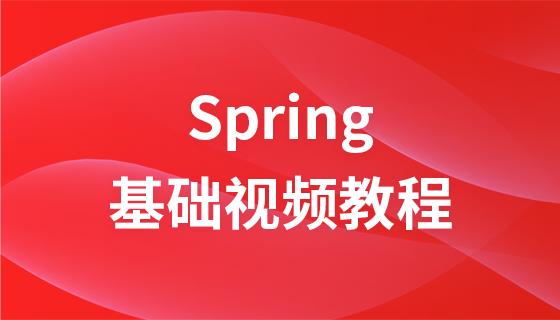這篇文章帶給大家的內容是關於基於spring的redis配置(單機和集群模式) ,有一定的參考價值,有需要的朋友可以參考一下,希望對你有所幫助。
所需的jar套件:spring版本:4.3.6.RELEASE,jedis版本:2.9.0,spring-data-redis:1.8.0.RELEASE;如果使用jackson序列化的話還額外需要:jackson -annotations和jackson-databind套件
spring集成redis单机版:
1.配置RedisTemplate
<bean id="redisTemplate" class="org.springframework.data.redis.core.RedisTemplate">
<property name="connectionFactory" ref="connectionFactory"/>
<property name="defaultSerializer" ref="stringRedisSerializer"/>
<property name="keySerializer" ref="stringRedisSerializer"/>
<property name="valueSerializer" ref="valueSerializer"/>
</bean>
2.配置connectionFactory
<bean id="connectionFactory" class="org.springframework.data.redis.connection.jedis.JedisConnectionFactory">
<!-- 配置ip -->
<property name="hostName" value="${redis.host}"/>
<!-- 配置port -->
<property name="port" value="${redis.port}"/>
<!-- 是否使用连接池-->
<property name="usePool" value="${redis.usePool}"/>
<!-- 配置redis连接池-->
<property name="poolConfig" ref="poolConfig"/>
</bean>
3.配置连接池
<bean id="poolConfig" class="redis.clients.jedis.JedisPoolConfig">
<!--最大空闲实例数-->
<property name="maxIdle" value="${redis.maxIdle}" />
<!--最大活跃实例数-->
<property name="maxTotal" value="${redis.maxTotal}" />
<!--创建实例时最长等待时间-->
<property name="maxWaitMillis" value="${redis.maxWaitMillis}" />
<!--创建实例时是否验证-->
<property name="testOnBorrow" value="${redis.testOnBorrow}" />
</bean>
spring集成redis集群
1.配置RedisTemplate步骤与单机版一致
2.配置connectionFactory
<bean id="connectionFactory" class="org.springframework.data.redis.connection.jedis.JedisConnectionFactory">
<!-- 配置redis连接池-->
<constructor-arg ref="poolConfig"></constructor-arg>
<!-- 配置redis集群-->
<constructor-arg ref="clusterConfig"></constructor-arg>
<!-- 是否使用连接池-->
<property name="usePool" value="${redis.usePool}"/>
</bean>
3.配置连接池步骤与单机版一致
4.配置redis集群
<bean id="clusterConfig" class="org.springframework.data.redis.connection.RedisClusterConfiguration">
<property name="maxRedirects" value="3"></property>
<property name="clusterNodes">
<set>
<bean class="org.springframework.data.redis.connection.RedisClusterNode">
<constructor-arg value="${redis.host1}"></constructor-arg>
<constructor-arg value="${redis.port1}"></constructor-arg>
</bean>
<bean class="org.springframework.data.redis.connection.RedisClusterNode">
<constructor-arg value="${redis.host2}"></constructor-arg>
<constructor-arg value="${redis.port2}"></constructor-arg>
</bean>
......
</set>
</property>
</bean>
或者
<bean name="propertySource" class="org.springframework.core.io.support.ResourcePropertySource">
<constructor-arg name="location" value="classpath:properties/spring-redis-cluster.properties" />
</bean>
<bean id="clusterConfig" class="org.springframework.data.redis.connection.RedisClusterConfiguration">
<constructor-arg name="propertySource" ref="propertySource"/>
</bean>序列化配置簡述:
1.stringRedisSerializer:由于redis的key是String类型所以一般使用StringRedisSerializer 2.valueSerializer:对于redis的value序列化,spring-data-redis提供了许多序列化类,这里建议使用Jackson2JsonRedisSerializer,默认为JdkSerializationRedisSerializer 3.JdkSerializationRedisSerializer: 使用JDK提供的序列化功能。 优点是反序列化时不需要提供类型信息(class),但缺点是序列化后的结果非常庞大,是JSON格式的5倍左右,这样就会消耗redis服务器的大量内存。 4.Jackson2JsonRedisSerializer:使用Jackson库将对象序列化为JSON字符串。优点是速度快,序列化后的字符串短小精悍。但缺点也非常致命,那就是此类的构造函数中有一个类型参数,必须提供要序列化对象的类型信息(.class对象)。
使用spring註解式來配置redis,這裡只配置叢集範例
@Configuration
@EnableCaching
public class RedisConfig extends CachingConfigurerSupport {
//spring3支持注解方式获取value 在application里配置配置文件路径即可获取
@Value("${spring.redis.cluster.nodes}")
private String clusterNodes;
@Value("${spring.redis.cluster.timeout}")
private Long timeout;
@Value("${spring.redis.cluster.max-redirects}")
private int redirects;
@Value("${redis.maxIdle}")
private int maxIdle;
@Value("${redis.maxTotal}")
private int maxTotal;
@Value("${redis.maxWaitMillis}")
private long maxWaitMillis;
@Value("${redis.testOnBorrow}")
private boolean testOnBorrow;
/**
* 选择redis作为默认缓存工具
* @param redisTemplate
* @return
*/
@Bean
public CacheManager cacheManager(RedisTemplate redisTemplate) {
RedisCacheManager cacheManager = new RedisCacheManager(redisTemplate);
//cacheManager.setDefaultExpiration(60);
//Map<String,Long> expiresMap=new HashMap<>();
//expiresMap.put("redisCache",5L);
//cacheManager.setExpires(expiresMap);
return cacheManager;
}
@Bean
public RedisClusterConfiguration redisClusterConfiguration(){
Map<String, Object> source = new HashMap<>();
source.put("spring.redis.cluster.nodes", clusterNodes);
source.put("spring.redis.cluster.timeout", timeout);
source.put("spring.redis.cluster.max-redirects", redirects);
return new RedisClusterConfiguration(new MapPropertySource("RedisClusterConfiguration", source));
}
@Bean
public JedisConnectionFactory redisConnectionFactory(RedisClusterConfiguration configuration){
JedisPoolConfig poolConfig = new JedisPoolConfig();
poolConfig.setMaxIdle(maxIdle);
poolConfig.setMaxTotal(maxTotal);
poolConfig.setMaxWaitMillis(maxWaitMillis);
poolConfig.setTestOnBorrow(testOnBorrow);
return new JedisConnectionFactory(configuration,poolConfig);
}
/**
* retemplate相关配置
* @param factory
* @return
*/
@Bean
public RedisTemplate<String, Object> redisTemplate(JedisConnectionFactory factory) {
RedisTemplate<String, Object> template = new RedisTemplate<>();
// 配置连接工厂
template.setConnectionFactory(factory);
//使用Jackson2JsonRedisSerializer来序列化和反序列化redis的value值(默认使用JDK的序列化方式)
Jackson2JsonRedisSerializer jacksonSeial = new Jackson2JsonRedisSerializer(Object.class);
ObjectMapper om = new ObjectMapper();
// 指定要序列化的域,field,get和set,以及修饰符范围,ANY是都有包括private和public
om.setVisibility(PropertyAccessor.ALL, JsonAutoDetect.Visibility.ANY);
// 指定序列化输入的类型,类必须是非final修饰的,final修饰的类,比如String,Integer等会跑出异常
//om.enableDefaultTyping(ObjectMapper.DefaultTyping.NON_FINAL);
jacksonSeial.setObjectMapper(om);
// 值采用json序列化
template.setValueSerializer(jacksonSeial);
//使用StringRedisSerializer来序列化和反序列化redis的key值
template.setKeySerializer(new StringRedisSerializer());
// 设置hash key 和value序列化模式
template.setHashKeySerializer(new StringRedisSerializer());
template.setHashValueSerializer(jacksonSeial);
template.afterPropertiesSet();
return template;
}
}注意事項:
1.採用註解式設定redis或使用@Configuration需要在設定檔中指定掃描什麼哪些包下的設定文件,當然如果是springboot那當我沒說過這句話...
<context:component-scan base-package="com.*"/>
2.spring3支援註解方式取得Value,但是需要在載入的設定檔設定檔路徑即可,具體值自己指定吧...
<value>classpath:properties/spring-redis-cluster.properties</value>
3.由於我們公司原有的框架採用的是spring2.5.6, 而對於spring2 和spring2 主要區別(當然是我自己覺得啊)是把各模組分成了不同的jar,而對於使用spring-data-redis模板化處理redis的話,單機情況下spring2.5.6和spring4不會衝突,而如果使用集群模式需要配置redis集群的時候就會出現jar包衝突,這個時候就看要如何取決了,可以直接使用jedisCluster來連接redis集群(不過很多方法都需要自己去寫),也可以把spring2.5.6替換成高版本的spring4,只是框架替換需要注意的事情更多了啊(我們公司的直接全部替換沒啥毛病好吧,O(∩_∩)O哈哈~),至於重寫JedisConnectionFactory和RedisClusterConfiguration我還沒去嘗試,這個可以作為後續補充吧...
4.順便說句,spring4不在支援ibatis了,如果你需要用spring4,又需要連接ibatis的話,最粗暴的方式是把spring-orm包換成spring3版本,其他的jar還是4版本即可。 (當然我這邊直接替換是沒啥問題,但同3一樣可能有潛在問題啊,所以說嘛,公司有時候還是需要更新換代下吧...)
#以上是基於spring的redis配置(單機和叢集模式)的詳細內容。更多資訊請關注PHP中文網其他相關文章!
